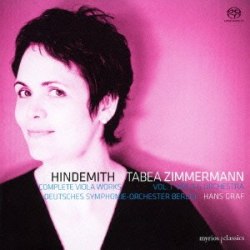| 
|
Paul HINDEMITH (1895-1963)
Complete Works for Viola - Vol. 1
Der Schwanendreher (The Swan Turner) concerto after old folk songs for viola and small orchestra [26:47]
Trauermusik (Music of Mourning) for string orchestra with solo viola [7:40]
Kammermusik, No. 5, Op. 36, No. 4 for solo viola and large chamber orchestra [19:23]
Konzertmusik, Op. 48a for solo viola and large chamber orchestra (early edition) [26:07]
Tabea Zimmermann (viola)
Deutsche Sinfonie-Orchester Berlin/Hans Graf
Recorded: August 2012 Jesus Christ Church, Berlin/Dahlem, Germany
MYRIOS CLASSICS MYR010  [79:59]
[79:59]
We are often told how significant a composer Paul Hindemith is in
the annals of twentieth-century music. On the other hand we rarely
see his greatly underrated works included on concert programmes, especially
in the UK. If it wasn’t for the Symphonic Metamorphosis
on Themes of Carl Maria von Weber (1943) and the Symphony:
Mathis der Maler Hindemith’s music would be heard live
hardly at all.
I found this Myrios Classics Hindemith release to be a glorious surprise,
near revelatory. Twice in recent years I have attended concerts in
Berlin and seen renowned violist Tabea Zimmermann play both the Berlioz
Harold in Italy with the LSO and Wolfgang Rihm’s Viola
Concerto ‘Über die Linie’IV with
the Deutsche Sinfonie-Orchester Berlin (DSO Berlin). I witnessed at
first hand just how expert a musician she is. For each of the last
three years I have been fortunate to have seen the DSO in concert
in Berlin and Dresden. On each occasion the orchestra was in quite
marvellous form. I remain puzzled why this orchestra is not as celebrated
as the quality of its playing deserves. Having firsthand knowledge
of the excellence of the performers and of Hindemith’s striking
music my expectations were naturally high. In truth they were exceeded.
This Hindemith release is quite stunning.
Der Schwanendreher is a concerto after old folk songs for viola
and small orchestra and was written in 1935. It incorporates folk
melodies into the writing was premiered in 1935 at Amsterdam by the
Concertgebouw under Willem Mengelberg with the composer as soloist.
It seems that the title was taken from the folk song ‘Seid
ihr nicht der Schwanendreher’ (Aren’t you the Swan
Turner?). Hindemith uses this in the third movement. I especially
enjoyed Zimmermann’s playing of the mellow and rather relaxing
and even meditative central movement. A brisker central section with
attractive burbling woodwind is marvellously performed by the Berlin
players.
In 1936 whilst Hindemith was in England to play his Der Schwanendreher
the death of King George V was announced. Realising that the generally
cheerful Der Schwanendreher had been rendered unsuitable by
the solemn occasion Hindemith composed in a few hours the score Trauermusik
(Music of Mourning) for string orchestra with solo viola. The score
is cast in four brief movements played without a break. A performance
of Trauermusik was quickly arranged for a BBC radio broadcast
in London played by the BBC Orchestra conducted by Adrian Boult with
the Hindemith as soloist. Here Zimmermann’s playing feels genuine
compassionate and is suitably melancholic yet contains reasonably
appealing melodies.
Scored for solo viola and large chamber orchestra the Kammermusik
No. 5, Op. 36/4 is scored for a substantial number of woodwind and
brass players. It was written in 1927. With the composer as soloist
the work was introduced in 1927 at the Krolloper Berlin with the Staatskapelle
under Otto Klemperer. In this appealing four movement work the viola
is required to play almost continuously. The extended second movement
Langsam is particularly effective with the soloist maintaining
a wistful and rather yearning quality against dark and generous wind
accompaniment. I especially enjoyed the entertainingly boisterous
final movement Variante eines Militärmarsches. It includes,
rather tongue-in-cheek, a rather tawdry Bavarian military march.
Bearing a dedication to ‘Darius und Madeleine Milhaud’,
theKonzertmusik, Op. 48a is scored for solo viola and large
chamber orchestra. It seems that the Berliner Philharmoniker under
Furtwängler with Hindemith himself playing viola gave the première
of the original six movement version of the work in March 1930 in
Hamburg. A revised five movement version was given in September that
year at Graz played by the Städtisches Orchester Graz under Oswald
Kabasta with the composer again as soloist. The original six movement
version, which was only published in 1993, is played here by Zimmerman.
It is claimed in the booklet notes that this is the world premiere
recording of the original edition. Prominent throughout, Zimmerman
brings an intense and heartbreakingly yearning quality to the second
movement which is marked Ruhig gehend. I was struck by the
deep sense of introspection that permeates the fifth movement Langsam.
Schreitende Achtel.
There is a heartfelt passion and robust edge to Zimmermann’s
playing which blows away the cobwebs and brings these works very much
to life. Making a highly sympathetic partner the excellent DSO Berlin
is warmly expressive and well detailed. Austrian conductor Hans Graf
holds everything together with confidence. I am delighted by this
wonderfully clear SACD with its vivid and warm sound which I played
on my standard CD player. The slightly forward balance of the solo
viola is very much to my taste. This is certainly a ‘Record
of the Month’. I’m so enthusiastic about this release
that will definitely be one of my ‘Records of the Year’.
Michael Cookson
Previous review: Dominy Clements (October 2013 Recording of the Month)
 |
 |
|



 All Nimbus reviews
All Nimbus reviews








